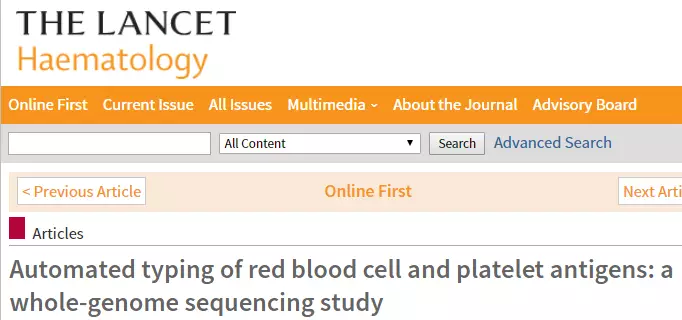Unlock more blood types, the accuracy rate is over 99%! The new era of blood transfusion under genome sequencing is coming
May 25, 2018 Source: Biological Exploration
Window._bd_share_config={ "common":{ "bdSnsKey":{ },"bdText":"","bdMini":"2","bdMiniList":false,"bdPic":"","bdStyle":" 0","bdSize":"16"},"share":{ }};with(document)0[(getElementsByTagName('head')[0]||body).appendChild(createElement('script')) .src='http://bdimg.share.baidu.com/static/api/js/share.js?v=89860593.js?cdnversion='+~(-new Date()/36e5)];In addition to the well-known blood types of A, B, AB and O, there are hundreds of different blood group "antigens" on the red blood cells that trigger the body's immune response. According to the FDA, as many as 16 people die each year from a red blood cell antigen mismatch that is different from the ABO blood group. There is currently no way to measure all blood antigens. Recently, researchers from institutions such as Harvard Medical School have developed a computer program that can determine individual blood group differences comprehensively, economically, and efficiently, with an accuracy rate of over 99%.

Credit: Wikimedia Commons
Blood transfusion is one of the most common procedures in medicine, with more than 11 million units of blood transfused each year in the United States. However, if the blood type is not adapted, the complications caused by blood transfusion may be life-threatening. Foreign antigens carried on the donor cells stimulate the production of antibodies, thereby destroying the infused donor cells. Since birth, people have antibodies specific to ABO blood type, but during pregnancy, when receiving multiple blood transfusions, exposure to fetal cells or donor cells can stimulate other antibodies against specific blood antigens.
Currently, most tests for blood donors and patients include only ABO blood group systems and Rh blood group systems, but there are more than 300 known red blood cell antigens, in addition to 33 platelet antigens. To create a cost-effective method for antigen detection, the author of the communication author, Dr. William J Lane, collaborated with scientists who directed the MedSeq project (the first randomized trial of healthy adult genome-wide sequencing) and blood group genetics experts at the New York Blood Center. A database and a computer software algorithm called the blood typer (bloodTyper) that can quickly and accurately predict a person's blood group antigen spectrum from genomic sequences.
The study was published in The Lancet Haematology on May 17th under the title "Automated typing of red blood cell and platelet antigens: a whole-genome sequencing study".

DOI: https://doi.org/10.1016/S2352-3026(18)30053-X
“This approach has the potential to be the first routine clinical application of genomics to provide medical care to patients who need blood transfusions,†said Connie M. Westhoff, lead author of the New York Blood Center. “It can prevent serious or even fatal Complications, because if a blood transfusion is needed in an emergency, once the patient is allergic, they have a lifetime risk of a hemolytic transfusion reaction."
Lane, Westhoff and colleagues further validated the software by comparing it with traditional, labor-intensive methods. When entered from the genome of MedSeq project participants, the accuracy of blood group identification was over 99%.
One of the senior authors of the study, Professor Green of Harvard Medical School, said: "With genome-wide sequencing becoming a regular part of healthcare, this report demonstrates an unprecedented benefit of using genome sequencing to identify potential blood transfusions that require rare blood types. Recipients and individuals who are able to safely provide blood types."
References: 1) New era for blood transfusions through genome sequencing
Zhoushan City Shuangying Aquatic Products Co., Ltd.  , https://www.shuangying-aquatic.com